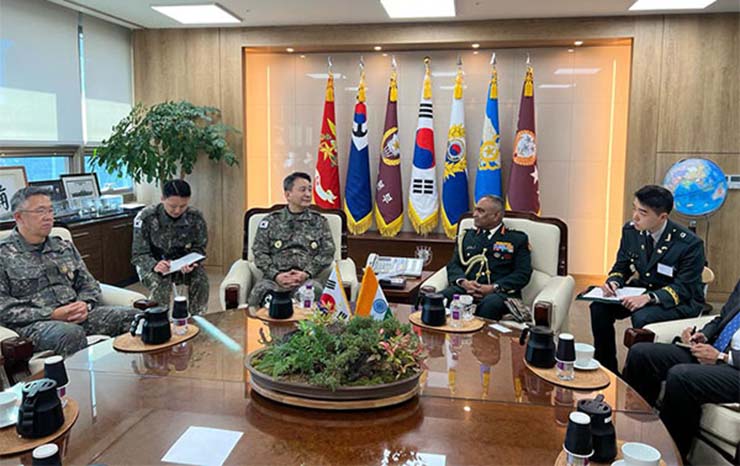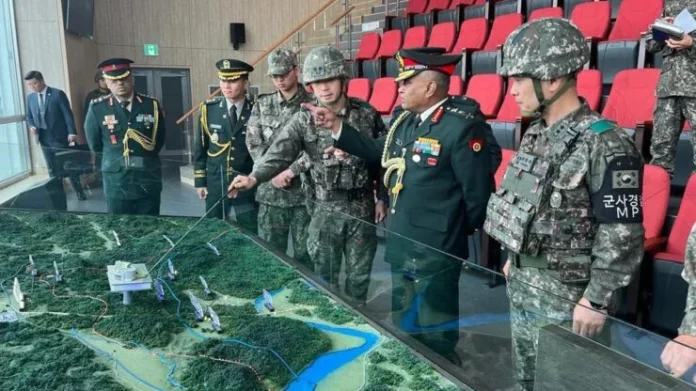New Delhi: India’s Chief of the Army Staff (COAS), General Manoj Pande visited South Korea from November 20 to November 24. During the visit he met with South Korean Vice Minister of Defence Acquisition Programme Administration and also called on General Kim Seung-yum, Chairman and joint Chief of Staff of the Republic of Korea. Apparently the focus of these meetings was to discuss aspects related to further strengthening of military ties and bilateral defence cooperation between the two countries.
Gen Pande also visited various Korean defence establishments and Tech labs, including Agency of Defence Development, where he was briefed on the on going R&D and latest developments in the fields of AI, Autonomous Vehicles, Man-Unmanned Teaming & Robotics.
Gen Pande’s visit commenced on November 20, a momentous day in the history of India-Korean relations, as 73 years back, on November 20, 1950, 60 Para Field Ambulances of the Indian Army landed in Busan to provide much-needed medical support to the South Korean army during the Korean War. Further, India and South Korea celebrates 50 years of diplomatic ties in 2023.
Indo-Korean Defence Ties
As per an Indian Army’s statement, the Army Chief was briefed on security matters at the Joint Security Area & Demilitarised Zone, gaining essential insights into the sensitive zone’s security dynamics. And his visit to the Cyber Command provided additional insights into countering sophisticated cyber threats.
In fact, the visit extended beyond formal meetings and included visits to Korea’s prominent defence establishments such as Defence Acquisition Programme Administration (DAPA), Korean Army Centre for Future and Innovation (KARCFI), and the Agency for Defence Development at Daejeon.
COAS was briefed on security matters at the Joint Security Area & Demilitarised Zone, gaining essential insights into the sensitive zone’s security dynamics. And his visit to the Cyber Command provided additional insights into countering sophisticated cyber threats
Gen Pande also visited a Drone Combat Unit and undertook a tour of the Border Management and Surveillance Facility. At ADD, he also received briefings on ‘cutting-edge’ developments in AI, Autonomous Vehicles, Man-Unmanned Teaming, and Robotics, with further advancing insights into technological advancements in defence.
Earlier, in September 2023, South Korean President Yoon Suk Yeol visited India to attend the G-20 Summit with a delegation of eleven companies. This showed the Korean interest to engage with the Indian defence industry to explore joint ventures, technology transfer, and bilateral trade in an array of segments spread across artillery, radar and satellite communications, military power systems and aerial and naval platform sub-system supplies.
The Korean delegation’s visit was preceded by Deputy National Security Advisor Vikram Misri’s Seoul tour in August 2023 for the 4th India-RoK Dy NSA level Strategic Dialogue and to increase defence industry cooperation.
Indian defence industry’s apex body, Society of Indian Defence Manufacturers (SIDM) had arranged a meeting with the Indian manufacturers and suppliers for the visiting Korean delegation to push for definite outcomes. On its part, SIDM has created multiple platforms for engagement with the South Korean defence industry and holds an MoU with the Korean Defence Industry Association and the Changwon Industry Promotion Agency.
In September 2023, South Korean President Yoon Suk Yeol visited India to attend the G-20 Summit with a delegation of eleven companies. This showed the Korean interest to engage with the Indian defence industry to explore joint ventures, technology transfer, and bilateral trade in an array of segments
Apparently, the South Korean delegation was keen to find Indian partners for joint-ventures, technology transfer and trade, with some of the companies looking forward to sign MoUs with participating Indian companies at the interaction.
The delegation for B2B engagement comprised of: Shin Kum Ha Co. Ltd, which deals in high precision machining, and automotive composite parts; Hansung S&I, which is into military power systems, and helicopter sub-parts; KIPCO – whose main products are radars, satellite communication and electro-optics; Mirae Air which makes wing rib and frame assemble for air platforms; SG Solution, the maker of K9 self-propelled artillery and NDT Engineering, an aviation wing machining firm. The Indian defence manufacturers held discussions for building utility helicopters, diesel submarines, ammunitions and lithium batteries.

Moreover, a roadmap for defence industries cooperation was signed between the two countries in September 2019. Which translates into action, with a belief that both can enhance cooperation in critical and emerging technologies.
During the last defence bilateral talks between Defence Minister Rajnath Singh and his South Korean counterpart Suh Wook, held in Delhi in late March 2023, the two sides had agreed to go for joint production and export of military hardware, and push cooperation in cyber and space domains for expanding defence and security ties.
India and South Korea are already co-developing defence systems. Like, Larsen and Toubro is producing K9 Vajra, a 155mm, 52 Calibre artillery gun, with the help of Korea’s Hanwha Defence.
Visit’s Focus Areas
Apparently Gen Pande covered all those verticals, which have already been discussed between the Indian and South Korean ministers and companies and he received first hand knowledge of the South Korean companies’ expertise in these fields, and it is expected that this interaction may result in greater collaboration and partnership between the two countries.
Ostensibly, in face of the tremendous transformations happening in the Indo-Pacific, India is hedging its bets against any unforeseen eventuality. For this reason, keeping in mind the geo-political shifts in the region, India is wisely engaging with South Korea to increase its defence footprint
Ostensibly in face of the tremendous transformations happening in the Indo-Pacific, India is hedging its bets against any unforeseen eventuality. For this reason, keeping in mind the geo-political shifts in the region, India is wisely engaging with South Korea to increase its defence footprint, in addition to developing alternate suppliers for its defence procurement needs. In this endeavour it is also guided by its Make in India programme, thus seeking greater cooperation with countries like South Korea, which are keen to engage with India to increase their defence manufacturing platforms through partnership and collaboration.
In addition, with due cognisance of China’s ascent as not just a regional but a global power, India has to hedge its bets against its neighbour, in addition to watching both its northern and western borders. This also translates into India thinking pragmatically and acting proactively to ward off any threat from either of its immediate neighbours. Keeping that in mind increasing its collaboration with regional nations is a wise tactical move.





